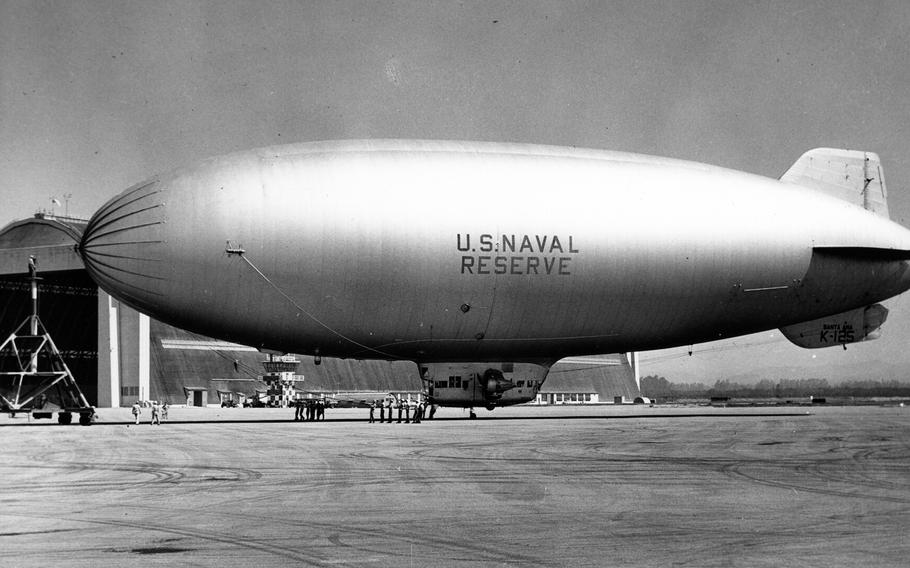Orange County, Calif., firefighters battle a fire at the historic north hangar at the former Marine Corps Air Station Tustin on Tuesday, Nov. 7, 2023. (Mark Rightmire, Orange County Register/TNS)
One of two former blimp hangars once used by the Marine Corps that have been landmarks in Southern California since World War II caught fire Tuesday, and firefighters battling the blaze were ordered to withdraw and wait for the structure to collapse, according to local fire officials.
“Due to the dynamic nature of the fire, and the imminent danger of collapse, we have determined the most operationally sound method is to allow the structure to collapse, at which point ground crews can move in closer and aggressively work to extinguish the fire,” the Orange County Fire Authority posted on its website.
The north hangar at the former Marine Corps Air Station Tustin, which is about 40 miles southwest of Los Angeles, caught fire at about 1 a.m. Tuesday, county fire chief Brian Fennessy said at a news briefing. He said no one was believed to be in the building at the time of the fire and there were no reported injuries. The adjacent south hangar was undamaged.
Each of the 300,000 square-foot buildings is constructed primarily of 1 million feet of Douglas fir lumber from Oregon. They are among the largest free-standing wooden structures in the world, according to the National Trust for Historic Preservation.
The north hangar — also known as hangar 1 — was fully engulfed in the fire. The three-alarm fire led to more than 70 firefighters and 16 firefighting vehicles from across Southern California responding to flames that lit up the pre-dawn sky in central Orange County, home to 3.7 million residents. Initial efforts to stop the fire included water-dumping CH-47 Chinook helicopters usually used to battle wildfires.
An aerial view of the historic hangars of the former Marine Corps Air Station Tustin. (Tustin Area Historical Society)
The hangar had ceased military function nearly 25 years ago when the Marines moved out. It was used as a film location and for storage in later decades but was completely shuttered following a 2013 windstorm that weakened the roof.
The possible instability of the structure, open area around the hangar and the absence of any contents of value contributed to the decision to withdraw personnel and wait for outcome of the blaze, fire officials said.
“The biggest fear is collapse and getting our firefighters injured,” county Fire Authority Capt. Thanh Nguyen said in a statement.
At 17-stories tall, with a length of about 1,088 feet and width of just less than 300 feet, the blimp hangars were landmarks for generations of Southern California, looming just off Interstate 5 in Orange County and next to John Wayne Airport.
The two all-wood hangars were rapidly built following the Japanese attack on Pearl Harbor in 1941 to house 12 K-class blimps built by the Goodyear Co. of Akron, Ohio. Each blimp could cruise at just less than 60 mph for more than 38 hours with a range of 2,025 miles.
The installation was originally commissioned in October 1942 as the Santa Ana Lighter-Than-Air Base. It later became the Santa Ana Naval Air Station.
The Navy blimps carrying a crew of up to 10 patrolled the California coastline during World War II looking for possible Japanese attackers. They were armed with .50 caliber machine guns and four 350-pound depth charges.
The Tustin blimp base was decommissioned in 1949. The hangars were used for various purposes, including the storage of civilian aircraft in what was dubbed “Hangar City.”
The hangars and surrounding airfield were recommissioned as Marine Corps Air Facility Santa Ana in 1951. A hub of rotary aircraft training for the Marine Corps during the Vietnam War. It was renamed the Marine Corps Air Station Santa Ana in 1966. The name was changed again in 1979 to Marine Corps Air Station Tustin in recognition of the growing city adjacent to the base.
The hangars were used to store helicopters of squadrons attached to the 3rd Marine Aircraft Wing. The fixed-wing aircraft of the wing were based at the nearby Marine Corps Air Station El Toro.
As late as the 1980s, MCAS Tustin was home to 5,000 Marines and their families.

A blimp at the former Marine Corps Air Station Tustin in Tustin, Calif. (Tustin Area Historical Society)
Squadrons from MCAS Tustin took part in Operation Desert Storm in 1991, with helicopters carried as cargo from the nearby El Toro base in C-5 Galaxy transports for deployment in Saudi Arabia and Bahrain, prior to the assaults on Iraqi-occupied Kuwait.
In 1975, both hangars were listed on the National Register of Historic Places.
In 1991 and 1993, under the authority of the Defense Base Closure and Realignment Act of 1990, the Tustin and El Toro bases were ordered closed.
The Marines left MCAS Tustin, and the hangars were decommissioned in July 1999. Most of the aircraft were moved to Marine Corps Air Station Miramar in nearby northern San Diego County. Prior to the BRAC decisions, Miramar had served as a Naval Air Station. Other aircraft were dispersed to North Island Naval Air Station in San Diego.
All but 308 acres of the 1,600-acre Tustin base were conveyed to local authorities, developers and public agencies. The land has been developed into homes, businesses and recreational areas.
Plans called for the south hangar, also known as hangar 2, to be incorporated into the parks and a possible military museum. The north hanger, which caught on fire Tuesday, was scheduled for eventual removal. It has been used by film productions and as various kind of storage in the years since the base closure.
The combined crews in front of the blimp hangar at the former Marine Corps Air Station Tustin. (Tustin Area Historical Society)